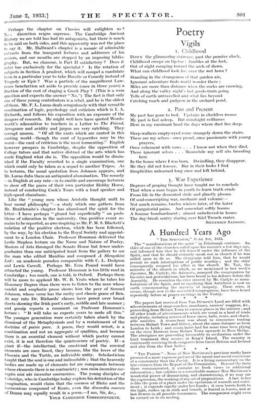A Hundred Years Ago "THE Sreenvroa," JUNE IsT, 1833.
The "manifestations of the spirit" in Edinburgh continuo.. An elder of one of the churches called upon his minister a few days ago, and informed him that he felt himself under the influence of the Spirit, and that he should certainly speak out in church if he was called upon to do so. The clergyman told him, that he would permit no such interruptions of public. worship ; and the elder consequently resigned his office in the church. Mr. Tait, the minister of the church in which, as we mentioned in last week's Spectator, Mr. Carlyle, the Advocate, annoyed the congregation by his cries and gesticulations, has been heard in his defence before the Assembly. He considers the cries uttered by Mr. Carlyle as mani- festations of the Spirit, and as signifying that Antichrist is now on earth consummating the mystery of iniquity. Those cries, it seems, though new to the assembled congregation, have been hoard repeatedly before at prayer-meetings in the Vestry.
* * * *
The papers last received from Van Diemen's Land are filled with advertisements of stage-coaches, omnibuses, carriers' waggons, &c., proceeding from Hobart Town to various places in the interior ; and all other kinds of advertisements whieh are usual in a land of trade and plenty, including notices of horse-races, balls, routs, and charit- able societies. A steam-boat WWI about to commence trading between Hobart Town and Sidney, about the same distance as from London to Leith ; and steam-boats had for some time been plying on the river Derwent from Hobart Town upwards to Rose Bridge. The aborigines are proceeding favourably to civilization under the kind treatment they receive at King's Lsland. The country is continually receiving fresh emigrants from Great Britain and Ireland
and also from the East Indies. * * * *
"Tax PArasn."—None of Miss Martineau's previous works have presented a more vigorous picture of the moral and social conditions of a community than the Parish. It is a living commentary on the late extracts from the Report of the Commission. Beyond the facts there communicated, it contains no fresh views or additional information ; but exhibits in a remarkable manner Miss Martineau's wonderful power of dramatizing, and characterizing, if we may use the expression, the working of any set of propositions. A fact to her is like the germ of a plant under the operation of warmth and nutri • silent; it expands rapidly under her hands ; it soon bursts forth to the light, rushes up in stalk and branch, is buried in leaves, and at last flowers in all possible luxuriance. The comparison might even be carried on to its seeding.




































 Previous page
Previous page